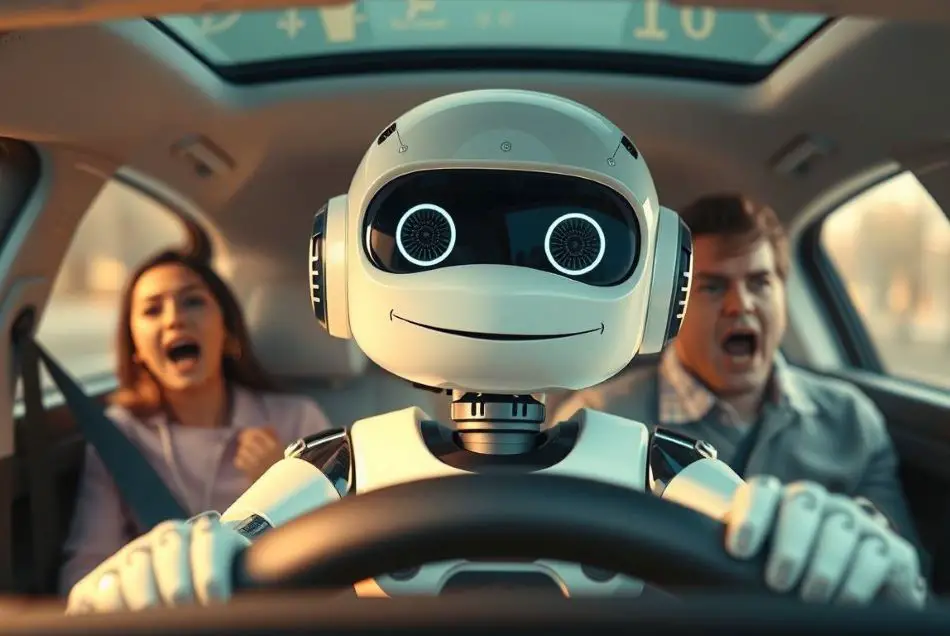Autonomous Cars: Safety concerns and the risk of auto accidents on our roads

The advent of self-driving cars represents an exciting step forward in technology, offering the promise of increased safety and convenience. However, autonomous vehicles also raise several ethical, economic and practical concerns that must be thoughtfully addressed before they hit the roads. One study found that only 7% of people surveyed had zero concerns about self-driving vehicles, with most people expressing some reservations.
Key Takeaways
- System failures: Autonomous cars raise safety concerns as system failures can lead to accidents and confusion between human and AI control.
- Ethical dilemmas: Self-driving technology challenges decision-making in unavoidable accidents, especially when choosing between protecting occupants or pedestrians.
- Loss of control: Passengers in autonomous vehicles lose control over driving decisions, creating trust and comfort issues for users.
- Job disruptions: Widespread adoption of autonomous vehicles may cause significant job losses in driving-based industries like trucking and delivery services.
- Policy necessity: Policymakers and developers must address safety, ethics, and economic impacts to ensure autonomous cars benefit society responsibly.
Safety risks and autonomous car accidents
Accidents can and do happen, and there were 1353 crashes involving level 2 vehicles (those with autonomous assistance) in 2023 in US alone.
One of the most troubling concerns with autonomous cars is the potential safety risks they could introduce, even though one study found human drivers are more likely to crash – human ride-hail drivers had a crash rate of 50.5 crashes per 1 million miles compared to 23 crashes per/million miles for self-driving cars.
Autonomous cars rely heavily on sensors, cameras, radar, and complex AI systems to navigate roads. If any of those systems fail, with possible catastrophic injuries after the crash. The handoff between computer and human control may lead to confusion and accidents. So avoiding accidents is more difficult now, with the increasing concerns about how autonomous cars will interact with human drivers and pedestrians. Pedestrians may make eye contact with a driverless car and step into traffic, not realizing the car will not stop, making avoiding accidents difficult.
Loss of control can lead to multiple cars accidents
Another concern is the lack of control vehicle occupants will have in an autonomous car. Most human drivers are fully in control and can intervene if they feel something is unsafe. But occupants in a self-driving car will have to cede all control to the vehicle’s computer. This could lead to a frightening loss of control if the autonomous system makes a poor decision. Passengers may feel helpless as the car breaks traffic rules or heads down an unsafe path, unable to stop it.
This loss of control and lack of trust in the technology may make many uncomfortable using autonomous vehicles.
New ethical dilemmas on motor vehicle accident liability

Another troubling aspect of autonomous cars is how they will handle ethical dilemmas on the road. For example, if an accident is unavoidable, how will the car decide whether to protect its occupants or pedestrians? What if choosing one or the other would lessen harm overall? Programming an autonomous car to make moral decisions is extremely complex. And there are concerns that companies may program cars to protect occupants at all costs to avoid liability.
Job losses
Some experts estimate autonomous vehicles could eliminate millions of driving jobs, like truck, taxi and delivery drivers. This massive job loss would have huge economic impacts. While new jobs may be created to service and monitor autonomous fleets, many unskilled workers will have a difficult time adapting. As the technology evolves, it may even reduce jobs for skilled drivers like EMTs and pilots. Policymakers will need to grapple with how to address this potential large-scale unemployment.
Autonomous vehicles are an exciting development but also raise serious concerns around safety, ethics, job loss and occupants’ loss of control. More rigorous testing and thoughtful policy changes are needed to ensure this new technology brings benefits, not harm, to society.
The public needs assurance that all the troubling risks associated with driverless cars are being actively addressed before they hit the roads.
Conclusion
Autonomous cars promise a future of convenience and innovation, but their journey to our roads comes with significant challenges. From safety risks and ethical dilemmas to job losses and the unsettling loss of control for passengers, these concerns demand careful consideration. Rigorous testing, clear policies, and transparent communication are essential to ensure this technology benefits society rather than disrupts it. As we stand on the brink of this transportation revolution, we must ask ourselves: Are we truly ready to share the road with machines?




